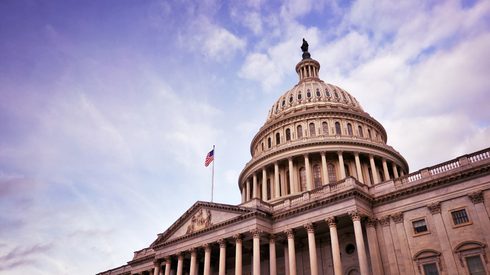The saga ended on December 18, with Japan’s Nippon Steel Corporation (NSC) emerging as the successful suitor for US Steel, acquiring the iconic steelmaker in an all-cash buy of $14.1 billion, plus the assumption of $800 million in debt.
The steep premium that Nippon Steel has paid for the 123-year-old company raised many eyebrows, but it underlines the faith foreign investors have in steel demand that is expected to be generated from government legislation, including the Inflation Reduction Act (IRA) and the CHIPS and Science Act (CHIPS Act).
Nippon Steel’s investment is an example of attracting foreign investment that will rejuvenate American manufacturing, instead of offshoring it, some market participants noted.
For example, Fitch Ratings has placed US Steel’s long-term issuer default rating (IDR), senior unsecured and secured ratings on “Rating Watch Positive,” reflecting the “meaningful increase in size and earnings of the combined entity following the expected close of the acquisition of US Steel by Nippon Steel Corporation.”
“NSC’s annual steel capacity of roughly 73 million tons represents more than triple US Steel’s annual capacity of roughly 23 million tons pro forma, [with] Big River 2 coming online in 2024 and the indefinite idling of Granite City Works,” Fitch Ratings said in a report on December 21.
The Nippon-US Steel deal could birth one of the world’s largest steel companies outside of China and may result in increased competition in the global steel market, Miriam Falk, senior steel analyst at Fastmarkets, said.
However, politicians from both sides of the aisle have expressed outrage at the thought of an all-American corporation being sold off to foreign interests, and even the Biden administration has pledged “serious scrutiny” of the tentative $14.9 billion takeover, according to a statement released on December 21 by National Economic Advisor Lael Brainard.
US Steel said in a statement sent to Fastmarkets on December 22 that it notified the administration on the day the acquisition was announced that it would voluntarily file for review.
“Japan is an important ally to the United States, and NSC currently operates multiple steel facilities across the USA,” the statement said. “NSC is a respected and trusted company that has made substantial commitments to support US Steel’s United Steelworkers-represented employees and non-represented employees, communities and customers. This will strengthen the American steel industry, American jobs, America’s national security and America’s supply chain security.”
Reuben Guttman, partner at Guttman, Buschner & Brooks PLLC told Fastmarkets that the backlash was expected.
“Remember that US Steel is synonymous with American manufacturing,” Guttman said. “It was formed…when JP Morgan merged Carnegie Steel with Federal and National Steel. So, in a sense, the optics are selling the child of Andrew Carnegie to a foreign company. It’s not just a deal; there is emotion attached to it.”
Other market participants, however, view the takeover as just a change in ownership.
“For as big of a transaction as this was, it could not be more ‘blah’ in my opinion,” a distributor said. “There is no consolidation, and most people, including my thoughts, are that Nippon will not make any major changes. So, it is just business as usual.”
Consolidation in the American steel industry
Consolidation in the steel industry is likely to ramp up in the near term, while integrated mills increase efficiency and technologically advance, allowing for higher productivity and capital to acquire more companies, Samir Kapadia, managing principal and head of trade at The Vogel Group, a bipartisan government affairs and consulting firm based in Washington DC, told Fastmarkets.
“That’s certainly going to be [more consolidation] in the near-to-mid-future because of the investments going into the industry,” Kapadia said. “Once those investments convert to productive operations, you’ll see more dry powder and impetus from steelmakers to acquire more market share.”
Now, after this historical sale, the US is down to just three American-owned major steelmakers: Nucor, Cleveland-Cliffs, and Steel Dynamics, Inc.
Consolidation and antitrust
The idea of consolidation raises questions about antitrust, which is concerned with monopolization and concerted activity that substantially affects competition, according to international trade organization the World Steel Association.
Reuben Guttman told Fastmarkets that the deal “absolutely could raise antitrust concerns.”
“The optics of a foreign entity controlling domestic production raises major political red flags. There is great incentive to tug at any thread that can block this deal,” Guttman said.
The Nippon-US Steel acquisition is expected to make the domestic steel market more competitive, and the deal should not raise the same potential antitrust regulatory flags as if US Steel was acquired by another domestic producer, Christopher Macchiaroli, partner at Silverman Thompson, told Fastmarkets.
“While certain members of Congress from steel producing areas may raise concerns and inquire as to the status of antitrust review by relevant government agencies, I do not believe that will get much traction in the long run,” Macchiaroli said.
Before the Nippon Steel announcement, rival domestic producer Cleveland-Cliffs was believed to the frontrunner in the race to acquire US Steel; had that deal gone through, it would evoke scrutiny from the Federal Trade Commission and the Department of Justice, sources had previously told Fastmarkets.
Impact on steel pricing
When Cleveland-Cliffs revealed that it was vying for US Steel in August, several market participants said that it would lead to increased prices across multiple steel markets.
In November, an automotive industry group lodged its opposition to Cleveland-Cliffs acquiring US Steel, citing increased costs and an overall negative impact on the US auto market.
The detractors expressed concerns that the Cleveland-Cliffs-US Steel merger would concentrate 100% of the country’s integrated steel production under one entity, which could result in consolidation of both operations and jobs, as well as putting the ownership of nearly all US iron ore mining and processing facilities into one company’s hands.
Some steel sources correlate steep and frequent mill hikes with the fact that there are only a handful of major domestic producers in the US.
“Before, even when mills would push through price hikes, it would be in the range of $20-40 per ton at one go,” a second distributor said.
Between October and December, domestic steelmakers pushed through multiple $100-per-ton price hikes, starting with setting the hot-rolled coil base price at $800 per short ton ($40 per cwt) on October 19 and taking it all the way to $1,100 per ton on December 6.
Consolidation’s impact on steel pricing hinges on multiple factors, including the “strategies and pricing policies adopted by the merged entity, evolving supply and demand dynamics, and global economic conditions,” according to Falk.
Increased competitiveness could either stabilize prices through improved supply chain management or lead to more assertive pricing strategies and innovative product offerings, which would impact other domestic steel producers, Falk said.
Kapadia also stressed that steel prices are impacted by a multitude of market conditions, and not solely market consolidation.
“Any market consolidation will increase bargaining power for the mills, which might play a role into increased prices,” Kapadia said.
This could be seen in the change in pricing environment when Cleveland-Cliffs itself went from being a raw materials supplier to being the largest flat-rolled steelmaker in the US after it purchased AK Steel for 1.1 billion and ArcelorMittal USA and its subsidiaries for around $1.4 billion, both in 2020.
These deals came about during a period when steel prices had plunged globally while the Covid-19 pandemic spread, oil prices collapsed and North American automakers halted production.
Fastmarkets’ daily steel hot-rolled coil index, fob mill US Midwest had fallen to a low of $21.89 per cwt ($437.80 per short ton) on April 30, 2020, the lowest point in more than four years, since they were assessed at $21.50 per cwt in late March 2016.
Soon after, hot-rolled coil prices started rising dramatically due to steel shortages, setting new records every week, and ultimately reaching $98.25 per cwt on September 20 and September 27 in 2021, the highest level since Fastmarkets began pricing this market in 1960.






